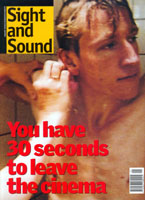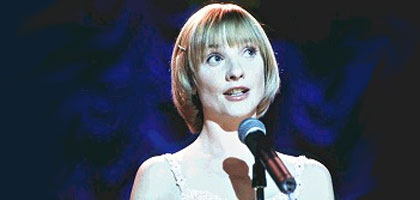
Spend a little time with me
Film of the Month: Little Voice

Brash as a Shirley Bassey ball gown, the new British musical Little Voice hits soaring highs at times but has its share of off-key moments, writes Andy Medhurst
Nobody who buys a ticket for Little Voice is going to feel short-changed. Crammed into its trim 96 minutes are a fairy tale, a psychodrama, a teen romance, a showstopper musical and a vulgar comedy so broad it threatens to burst from the screen just as Brenda Blethyn's backside constantly threatens to overflow her tights. Subtlety is not its trademark, and there's a full-bloodedness about the film which bludgeons you into admiration. It slaps you on the back, kicks you in the guts, dares you not to laugh and cry and leaves your subconscious reeling. In all honesty, I can't say that I particularly liked it, but liking is a fairly feeble criterion to apply to a film as aggressive and unrestrained as this. The sheer ferocity with which it operates is going to knock lots of audiences sideways. I can't imagine a film less likely to provoke indifference.
The story is deliberately schematic and fable-like. From the moment you see frail, isolated, waif-like LV (Jane Horrocks) and her boozy, foul-mouthed, cock-hungry mother Mari (Blethyn) it's clear that you're in Cinderella territory, with über-tart Mari as every imaginable Ugly Sister rolled into one. Prince Charming is Billy (Ewan McGregor), the cripplingly shy pigeon-fancier who sees in LV a kindred dysfunctional spirit, while the perverse Fairy Godmother is Ray (Michael Caine), the sleazy showbiz agent who realises that LV's astonishing ability to sing just like her favourite stars could be his last chance of netting a fortune. Will she perform or won't she? That's the crux of the plot, with Mari and Ray urging her in different ways to get on stage (Mari just nags, Ray finds more devious means), while Billy fears for the damage performing might do, and offers an escape route when the pressures become too much.
The trick Little Voice strives to achieve is the mixture of simplicity and profundity. While the actual narrative is so obvious it could have been painted on placards, the emotional and psychological resonances behind it delve in deep and distinctly murky waters. LV's devotion to the torch singers of past eras is a displacement of her devotion to her dead father, whose pantheon of chanteuses she has taken on wholesale. Her father recurs throughout the film, as the photograph pinned shrine-like on her wall, as a reassuring ghostly presence to comfort her at night, and as a phantom in the audience on her big night on stage. Viewers inclined towards psychoanalysis can draw their own conclusions, but even as somebody whose favourite Freud is Clement I felt increasingly uneasy at the clammy implications of this relationship. The undertow of incest becomes even harder to ignore through various devices which equate LV's tongue-tied suitor Billy with the father she adores so disturbingly.
If Little Voice is a love letter to Dad ('My Heart Belongs to Daddy' is even one of the old songs we hear), it hates Mum with a vengeance. Mari is given no redeeming features at all, a state of affairs exacerbated by Blethyn's uncharacteristically one-dimensional performance. Just as we are told nothing about what made her late husband so wholly wonderful, there are no hints at why Mari has turned out to be such an irredeemable old slapper. Well, perhaps one, a blink-and-you-miss-it scene which shows Mari at her drainingly dead-end job at the fish docks, the kind of work that would incline anyone to prioritise having a good time in their brief leisure hours. That's the only glimspe, since Little Voice has no sociological leanings.
Unlike the writer-director Mark Herman's previous film, the incomparably rich, wise and moving Brassed Off, Little Voice has no interest in the cultural contexts of people's lives. It simply wants to zoom in on their individual traits. Hence Herman rather wastes the promising possibilities of setting the film in the faded Yorkshire resort of Scarborough, apart from a few loving shots which relish the heroically preposterous tat of British seaside culture, moments that briefly recall the way Peter Chelsom used Blackpool in his marvellous Funny Bones. Otherwise it's hard to suppress a worry that Little Voice risks serving up northern working-class lives for the condescending titillation of audiences elsewhere (Blethyn's foghorn stab at a Yorkshire accent doesn't help here), a possibility which, coming from the creator of Brassed Off, is as regrettable as it is perplexing.
Setting all these worries aside, Little Voice is best enjoyed for three of its performances. Jane Horrocks' impersonations of her heroines are truly amazing, though her non-singing LV rather overplays the semi-autistic card (even Lillian Gish was never this innocent and unworldly). Jim Broadbent, one of the most reliably excellent actors alive, captures just the right blend of desperation and resignation as the tacky club-owner Mr Boo, and Michael Caine gorges like a starving man on the best script he's had since Educating Rita. There are unavoidable parallels between this film's Cinderella tendencies and Little Voice, but Ray here is a far darker proposition than the teddy-bear boozer Caine played in Rita. The one scene where Little Voice breaks out of its good-and-evil binary to stir up some real, complex emotions comes when Caine, drunk as a skunk and enraged that LV won't perform again, takes to the stage and bellows his way through Roy Orbison's 'It's Over', interjecting self-lacerating abuse to make the song's lyrics comment on his own screwed-up career. It's not just the best vertiginously perverse use of an Orbison song since the 'In Dreams' sequence in David Lynch's Blue Velvet. It might be the finest two minutes of Caine's screen life.
You should see Little Voice for that scene alone, indeed it deserves to be seen for its overall punchiness, vigour and verve, and while it's steaming along like a rhino on heat you won't have time to ponder its shortcomings. As for afterwards, well, I'm still troubled by its father-worship and its incitement to matricide, not to mention its class politics, its tediously laboured birds-in-flight equals freedom metaphor, and its recurring use of fat people to score easy laughs - this fat-phobia is so endemic that Little Waist might have been a better title.
It also avoids one glaring question: if LV's Dad's favourite singers were Judy Garland, Shirley Bassey, Marlene Dietrich, Gracie Fields and Marilyn Monroe, why has nobody twigged that he must have been gay as a goose? Feel free to discuss that in the pub after you've seen this shameless battering-ram of a film.
